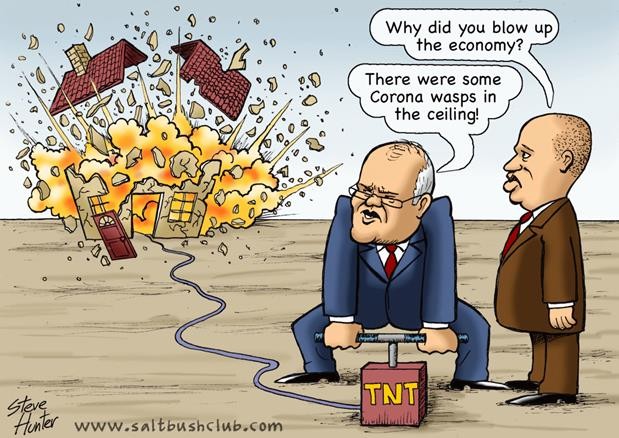
In order to kill Corona-wasps in the ceiling, politicians have knocked our economic house down. Now they dream of rebuilding the house by driving at full speed into the borrow-and-spend swamp. National Cabinet will soon find that Australia-after-Corona can’t afford a bloated public service, an overmanned and overpaid academia, throngs of able-bodied people on long-term welfare, too many tax-exempt foundations, endless donations to worthless UN fiefdoms and talk-fests, and a huge import bill to pay for all the things we once made here. Nor can we afford all the resources being wasted on dysfunctional submarines designed in Canberra, power systems mandated by the UN, Snowy 2 Green elephants, climate alarmism, emissions targets and green energy molly-coddling. We must re-build economic muscle not flab. Start with a couple of clean, modern reliable coal-fired power stations. This cheap reliable electricity may restart some defunct processing and manufacturing industries. Then build our submarines as they were designed – nuclear powered. Already there are no surpluses to spend on subsidising every struggling consumer and failing business. And a tidal wave of borrow-and-spend will just destroy the currency. As in post-war Germany, recovery can only come if governments slash taxes, repeal useless red and green tape, remove all barriers to new dams, railways, roads, power stations, mines and exploration, and encourage science and engineering education. They must doze the road blocks and then keep out of the way.
Since the days of the First Fleet, Australia has relied on our great primary industries – farming, mining, forestry and fishing. The pioneers started exporting wool, hides, tallow and timber; then came the gold rushes and great finds of silver, copper, lead-zinc and tin; our meat, cereals, sugar, butter and eggs fed allied soldiers through two world wars; and a bonanza of coal, oil, gas, iron and aluminium financed the baby boomers and the extravagant politicians of that era. When mining had a recession, farmers came to the rescue and vice versa. They also helped finance a continent of roads, railways, power stations, and dams and provided productive jobs for a growing population and a flood of migrants. If they were not so hampered by taxes, regulations and employment barriers, our farmers, foresters, fishers, engineers, explorers, miners, metallurgists, tradesmen and workers can pull us out of this hole too. They could even rebuild some of the great secondary industries lost because of our uncompetitive electricity and overheads.

